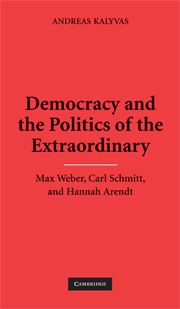Book contents
- Frontmatter
- Contents
- Acknowledgments
- List of Abbreviations
- Introduction: The Extraordinary and Political Theory
- I CHARISMATIC POLITICS AND THE SYMBOLIC FOUNDATIONS OF POWER
- II THE EXCEPTION AND CONSTITUTIONAL POLITICS
- III TAMING THE EXTRAORDINARY
- 7 Extraordinary Beginnings I: Arendt's Critique of Schmitt
- 8 Extraordinary Beginnings II: Arendt's Response to Schmitt
- 9 The Republic of Councils: Beyond Democracy and Liberalism?
- Conclusion: A Democratic Theory of the Extraordinary
- Bibliography
- Index
- References
7 - Extraordinary Beginnings I: Arendt's Critique of Schmitt
Published online by Cambridge University Press: 04 August 2010
- Frontmatter
- Contents
- Acknowledgments
- List of Abbreviations
- Introduction: The Extraordinary and Political Theory
- I CHARISMATIC POLITICS AND THE SYMBOLIC FOUNDATIONS OF POWER
- II THE EXCEPTION AND CONSTITUTIONAL POLITICS
- III TAMING THE EXTRAORDINARY
- 7 Extraordinary Beginnings I: Arendt's Critique of Schmitt
- 8 Extraordinary Beginnings II: Arendt's Response to Schmitt
- 9 The Republic of Councils: Beyond Democracy and Liberalism?
- Conclusion: A Democratic Theory of the Extraordinary
- Bibliography
- Index
- References
Summary
Arendt, apparently appalled by Schmitt's adherence to Nazism in 1933, never discussed his work directly. For this reason, I begin with a preliminary comparative discussion of Arendt and Schmitt, seeking to establish the terms of a dialogue that actually never took place. Her critique of sovereignty, her distinctive appropriation of the constituent power, and her theory of spontaneous beginnings become more intelligible if set against the background of Schmitt's political and constitutional theory. For example, the perplexing issue of extraordinary new beginnings, which is one of her central preoccupations, comes at times extremely close to Schmitt's constitutional writings. Arendt, much like Schmitt, focused on the relationship among radical breaks, revolutionary changes, and constitutional transformations. Both thinkers were similarly captivated by the politics associated with constitutional foundations and instituting, political practices.
Despite Arendt's lack of explicit engagement with Schmitt's political theory, one can still find some few, scattered remarks about Schmitt that reveal more than an accidental interest. In one of these, Arendt exhibits a hesitant appreciation of his “very ingenious theories” that “still make arresting reading.” On other occasions, she referred to Schmitt as “the famous professor of constitutional and international law” and as an “outstanding scholar[s]” and jurist. Although it is not clear what Arendt considered to be “ingenious” in Schmitt's theories or which attributes of his work qualify it as “famous” and “outstanding,” what stands out in these telegraphic comments is the importance she ascribed to the legal and constitutional dimension of his texts.
- Type
- Chapter
- Information
- Democracy and the Politics of the ExtraordinaryMax Weber, Carl Schmitt, and Hannah Arendt, pp. 194 - 231Publisher: Cambridge University PressPrint publication year: 2008



